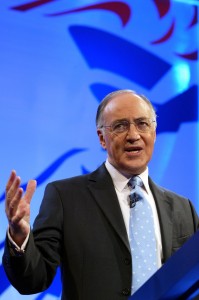Michael Howard – 2003 Response to the Chancellor’s Euro Assessment Statement
The response by Michael Howard, the then Shadow Chancellor of the Exchequer, in the House of Commons on 9 June 2003.
“The time of indecision is over.” That was what the Chancellor said about the euro six years ago.
It’s time, he said, to “establish clear national purpose”, to show “economic leadership”, to “make . . . hard choices”.
“Divisions,” he said, led to “indecision” and policy that was “inconsistent and unclear”.
Today ministers are speaking with one voice. They are united in common purpose, with one objective only in mind: to paper over the cracks which have riven them apart over the last few weeks.
Is it not clear, from any objective reading of the evidence, including the 18 volumes we were given today, that joining the euro would damage our prosperity, destroy jobs and lead to an irreversible loss of control over our economic policy? That is certainly our view. And it is the view of the clear majority of the people of this country.
Today’s statement is not the result of any real assessment of Britain’s national economic interest. It’s a result of the frantic efforts by the Chancellor and the Prime Minister to cover up their differences. After all, that’s why the five tests were thought up in the first place.
Indeed, the Prime Minister was so determined that the Treasury view wouldn’t be decisive that he thought the unthinkable. He suddenly saw the merits of Cabinet decision-making. There’s a first time for everything. This Prime Minister will pay any price to do down his Chancellor.
There they sit: united in rivalry. Each determined to frustrate the other. Each determined to scheme against the other. Each determined to do the other down. So there’s no clarity in policy. There’s no consistency of purpose. And each of them is the loser.
The Chancellor is losing. The Prime Minister is losing. And much more importantly, the British people are losing.
The Government’s ability to deliver has broken down; on health, on education, and now on the euro. Blair goes one way, Brown goes the other way, and bang goes the Third Way, lost in conflict, compromise and confusion. No wonder so little under this Government ever gets done.
That’s the price we are all paying for the fault line at the heart of this Government. What a humiliation for the Chancellor! Wasn’t it the Chancellor of the Exchequer who briefed there was no reason for another assessment this Parliament?
What if the 1,738 pages of data we’ve been given today had shown that the tests have been passed? How on earth are we to know whether a similar assessment in two or five or ten years’ time would reach a similar conclusion? If the data changes in one direction, how can anyone know it won’t change back again?
If, at any particular moment in time, our growth rate or inflation rate or interest rates are at similar levels to those in the eurozone, how do we know whether that convergence is permanent? Might it not be because our economies were like ships passing in the night, coming together for a moment before moving off in different directions?
The Chancellor predicted that trade with the EU could grow by as much as 50 per cent over 30 years. Will he confirm that his own department’s reports conclude that improved levels of trade are totally dependent on sustained convergence that has not yet been achieved?
At the moment, we can choose to have the same interest rates as the eurozone when that suits our needs. But why on earth should we be forced to do so when it doesn’t suit our needs? Why on earth should we accept the straitjacket of a one-size-fits-all interest rate when it’s not the right rate for our economy?
Competitiveness would be lost. Growth would be hampered. Jobs would be put at risk. And that will be just as true at the time of next year’s Budget and in a year’s time as it is now. Other countries have discovered these truths the hard way.
This party has learnt its lesson from the experience of fixed exchange rates. But the Government has not — despite the fact that the present Chancellor was calling for “early entry” to the ERM nearly a year before we joined. Today the national economic interest took a back seat. As the Government dithers, uncertainty is maximised.
This is the Prime Minister who promised in Opposition not to be derailed by “internal bickering” on Europe. This is the Government whose election manifesto in 1997 pledged that Labour would make a hard-headed assessment of Britain’s economic interests, rather than be “riven by faction”.
This is the Government which promised to “prepare and decide”. But now it’s “not prepare and decide”. It’s not even “wait and see”. It’s just “hope and pray”.
Today they haven’t put off a referendum because they’re against joining the euro or because they think it will damage the national economic interest. They haven’t put off a referendum out of conviction. The only reason we are not having a referendum now is that they know they can’t win it.
Today’s statement comes from a divided Government, a Government on the run. This whole exercise has been an exercise in deceit. The deceit that they had the national economic interest at heart. The deceit that they wanted an objective assessment of what this country needs. The deceit that they were united. It is time for an end to the deceit. It is time for an end to the duplicity.
This is not the end of the beginning for this Government. It is the beginning of the end. And the sooner it ends, the better it will be for the national economic interest and for the British people.


